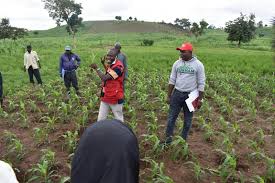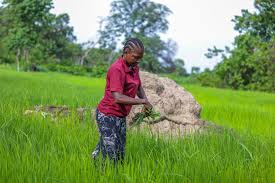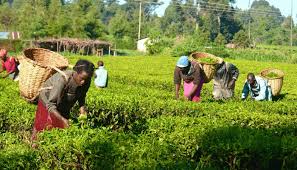In the last article, the problems hindering agricultural development were highlighted, particularly within the Nigerian context. About twenty (20) major issues affecting agricultural progress were identified.
These include: land tenure system, infrastructural deficiencies, inadequate financing, poor transportation, weak communication networks, lack of storage and processing facilities, high illiteracy levels among farmers, inefficient extension services, outdated tools and machinery, inconsistent government policies and programmes.
Poor marketing systems, pest and disease outbreaks, production uncertainties, limited access to farm inputs, negative attitudes towards farming, environmental degradation, cultural constraints, poverty, and weak farmers’ organisations. This article focuses on practical solutions to these problems.
Read Also: Most Beautiful Flowers: All You Need To Know About
Government and Institutional Measures to Improve Nigerian Agriculture

1. Land-Use Decree Implementation in Agriculture
The Land Use Decree of 1978, later amended in 1990, transferred land ownership from individuals to the government to assist landless but genuine farmers.
While this decree was designed to resolve land tenure challenges, its enforcement remains limited to urban areas. Effective enforcement in rural regions is essential to fully realise its benefits for agriculture.
2. Provision of Rural Infrastructural Facilities for Agricultural Growth
The lack of rural infrastructure is a significant barrier to agricultural development. Access roads should be constructed to ease the movement of farm produce to markets.
Rural communities also need electricity, water supply, healthcare services, educational institutions, and recreational centres to enhance the living conditions of farmers and reduce rural-urban migration.
3. Formation and Support of Agricultural Cooperative Societies
Cooperative societies, formed and managed by farmers, enable collective farming and access to funding.
The government should encourage the establishment of such societies and empower the Cooperative Department under the Ministry of Commerce and Industry to register, guide, and supervise their activities for sustainability.
4. Provision of Credit Facilities to Farmers
The Nigerian Agricultural and Rural Development Bank (NARDB) was created to meet the credit needs of farmers. Government must ensure that rural farmers benefit from this facility and that funds are strictly used for agricultural purposes.
Soft loan policies, guaranteed by the government without collateral, should be enacted to support poor farmers. Loan amounts must be significant enough to generate real impact.
5. Establishment of Efficient Agricultural Communication Systems
Modern agricultural development depends on timely information dissemination. Government should set up radio and television stations dedicated to agricultural programming.
While newspapers and magazines should be published by the Ministry of Agriculture and the Agricultural Development Project (ADP). These outlets must allocate adequate airtime and space to reach grassroots farmers.
6. Development of Effective Agricultural Transportation System
Government transportation services must extend to rural communities. Provision of refrigerated vehicles for transporting perishable goods such as vegetables, meat, eggs, and milk is vital, as individual farmers often cannot afford such vehicles.
7. Support for Agricultural Storage Facilities
To prevent post-harvest losses, government should help farmers build storage houses and cold rooms powered by generators in rural areas.
Additionally, public procurement and storage of surplus produce for use during scarcity should be promoted. Processing centres in villages would enable value addition and motivate increased production.
8. Implementation of Mass Literacy Programmes for Farmers
Adult education centres should be established in farming communities to reduce illiteracy levels. These centres must be adequately equipped and award certificates to participants.
Such programmes enable farmers to learn reading and writing without halting their agricultural activities, helping to phase out unproductive traditional beliefs.
9. Promotion of Agricultural Education in Schools
Agricultural science should be taught at all educational levels across the country. Making agriculture examinable in schools and establishing more faculties of agriculture and colleges will raise awareness of its national economic value.
Scholarships and post-graduation loans should be offered to encourage young people to pursue careers in agriculture.
Read Also: Bouqs Flowers: All You Need To Know About
10. Strengthening Agricultural Extension Services
A functional extension service is necessary for transferring research findings to farmers. It will also educate them on soil conservation practices and modern techniques through film shows, practical training, and demonstrations.

11. Creation of Agricultural Demonstration Plots and Educational Shows
Demonstration farms should be strategically located across the country to serve as learning centres. Agricultural shows and farmer training sessions conducted on actual farms will deepen the understanding of modern farming techniques.
12. Establishment and Expansion of Agricultural Research Institutes
More research institutes should be set up to cover different aspects of agriculture.
Existing institutes should be expanded to develop high-yielding seed varieties and livestock breeds that can withstand local conditions and boost productivity.
13. Provision of Subsidised Farm Inputs
Government should produce and distribute improved seeds and disease-resistant animal breeds. Subsidies should also cover fertilisers, pesticides, herbicides, and veterinary drugs, making them affordable to poor farmers and encouraging wider usage. Farm tools should be included in subsidy schemes.
14. Establishment of Tractor Hiring Centres to Support Mechanised Agriculture
Government must establish tractor hiring centres to serve farmers, especially those engaged in large-scale farming. These centres should be well-stocked with spare parts and employ qualified technicians to maintain machinery, helping farmers access mechanisation without the high cost of ownership.
15. Strengthening Veterinary Services for Livestock Production
Veterinary divisions in the Ministry of Agriculture must be fully operational to serve livestock farmers effectively. Services such as artificial insemination with improved semen should be accessible to upgrade local breeds.
Strict quarantine laws must be enforced within and across borders to prevent disease outbreaks.
16. Establishment and Support of Young Farmers Clubs in Schools
Young Farmers Clubs in secondary schools are essential for promoting agriculture among the youth. Currently underrepresented, these clubs should be mandatory in schools and adequately supported with farm inputs and funding.
They play a critical role in reshaping societal attitudes towards farming and fostering future agricultural professionals.
Do you have any questions, suggestions, or contributions? If so, please feel free to use the comment box below to share your thoughts. We also encourage you to kindly share this information with others who might benefit from it. Since we can’t reach everyone at once, we truly appreciate your help in spreading the word. Thank you so much for your support and for sharing!

